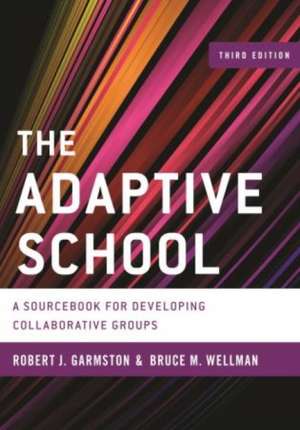The Adaptive School: Christopher-Gordon New Editions
Autor Robert J. Garmston, Bruce M. Wellmanen Limba Engleză Hardback – 31 aug 2016
This 3rd edition of the award winning Adaptive Schools Sourcebook provides both a theoretical and practical guide for groups and teams to develop and focus their collaborative energies to improve teaching practices and enhance student-learning outcomes. In five sections: Becoming Adaptive, Collaboration Matters, Meetings are Teachers Work, Resources for Inquiry, and Conflict, Change and Community, the authors draw on decades of personal experiences in schools and research from multiple disciplines to present powerful tools and useful templates for structuring the work of productive professional communities in schools. Readers will learn ways to develop and sustain the fundamental elements for enhancing social capital in schools: distinguishing between dialogue and discussion, establishing seven norms of collaboration, automating language patterns for inquiry and problem solving, facilitating groups and data teams, engaging in productive conflict, and building community. The book offers links to video clips demonstrating key skills, inventories for assessing groups, instruments for assessing personal skills, and a collection of over 150 meeting strategies and facilitator moves for engaging group members in productive interactions."
Preț: 484.02 lei
Preț vechi: 597.56 lei
-19% Nou
92.62€ • 96.94$ • 77.09£
Carte disponibilă
Livrare economică 10-24 martie
Livrare express 21-27 februarie pentru 46.50 lei
Specificații
ISBN-10: 1442223634
Pagini: 390
Dimensiuni: 178 x 254 x 26 mm
Greutate: 0.91 kg
Ediția:3
Editura: Rowman & Littlefield
Seria Christopher-Gordon New Editions



